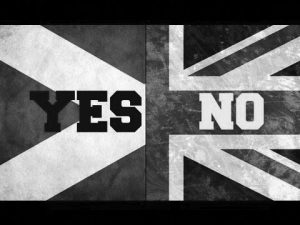Patrick Wolff, Staff Writer

Scottish voters rejected independence from the United Kingdom in a historic referendum vote on Thursday. The issue, which has caused a divide amongst many in Scotland and the greater U.K., prompted an unprecedented 85 percent of Scottish voters to cast their ballots, 55 percent of whom voted against independence, leaving 45 percent voting in favor.
The decision to remain a member of the U.K., a union which has lasted 307 years, was a cause of deep disappointment to those involved with the independence movement. Scotland First Minister Alex Salmond, one of the leaders of the independence movement and the leader of the Scottish National Party, one of three parties involved in the movement, announced on Friday that he would be resigning from his position as First Minister and will not seek re-election as the head of the Scottish National Party. Salmond’s platform of independence had propelled his political career for years.
The “Yes” campaign, which was the main force driving the independence movement, was launched in Edinburgh in 2012. The movement was a grassroots campaign that quickly spread throughout the nation and grew to significant numbers. Eventually, the “Yes” campaign came to be aligned with three major Scottish political parties, which are the Scottish National Party, the Scottish Green Party and the Scottish Socialist Party. The campaign also garnered the support of various Scottish actors and celebrities, including Alan Cummings, Brian Cox and former James Bond actor Sir Sean Connery.
Although the campaign was unsuccessful, it has prompted members of the British government to open talks of granting more autonomy to Scotland, as well as Wales and Northern Ireland. Many conservative members of the British Parliament have become angered at Prime Minister David Cameron for considering to grant more autonomy. Talks will continue to take place and if Parliament does decide to grant the other territories more autonomy, the United Kingdom will become a looser and more federal entity.
Many governments around the world, including the United States, announced that they were in favor of Scotland remaining a member of the U.K. The most pressing concern for the U.S. was that if the campaign for independence succeeded, Salmond planned on expelling Britain’s nuclear submarine bases from Scotland, a move which many feared would unnecessarily jeopardize western security in the face of rising threats around the world, particularly ISIS in the Middle East. The success of the independence movement would have also called into question the reliability and strength of the United Kingdom, whose close relationship with the United States has been crucial in the face of increasingly unstable situations around the world.
For now, Scotland will remain a member of the United Kingdom and will potentially receive a significant increase in their autonomy. Although the votes are in, many Scottish nationalists refuse to be deterred by the outcome. Many have found hope in the fact that the voting ended so closely, and plan to continue their push for a free Scottish state.
Leave a Reply